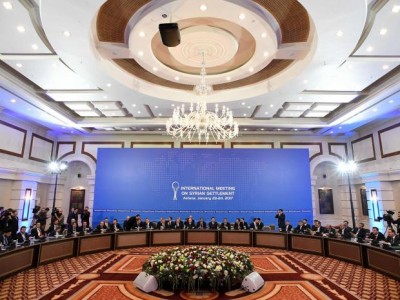Syria Ceasefire Agreement in Astana, Turkey, Russia, Iran Establish a Trilateral Mechanism

A week ago, Syria peace talks came to a significant end in Kazakhstan. During these two days the representatives of the Syrian government and representatives of the armed opposition groups, with the participation of Russia, Turkey and Iran, discussed establishing a more lasting ceasefire. It should be mentioned that UN Special Envoy for Syria Staffan de Mistura and US Ambassador to Kazakhstan George Krol also attended the negotiations as observers.
As a result, Iran, Russia and Turkey managed to sign a final communique and agreed on the establishment of a trilateral mechanism to support the ceasefire in Syria and monitor possible violations.
Does this meeting in Astana mean the end of the war in Syria? Such a prediction is quite optimistic. However, nowadays, there is no doubt that peace in Syria is possible. Astana became an optimal platform where conditions to hold the first official meeting between the Syrian government and the armed opposition were created.
Despite the fact that there wasn’t any direct contact between the Syrian government and the Syrian opposition groups, it was the first time when both sides could meet each other and exchange their opinions on the current situation in the country at such a high level. Head of the Syrian government delegation, Bashar Jaafari, even said that it wasn’t easy to sit in the same room with the opposition due to the passage of so much war violence, but it was very useful for finding a political solution to the conflict.
The peace talks in Astana further consolidated the truce in Syria which was achieved on December 30, 2016. The official representative of the opposition delegation, Yahya al-Aridi, said that Astana talks were the first to include Syrian armed opposition factions, giving them a higher chance of success.
In the near term, Astana can become a broader platform for negotiations on the Syrian conflict. Perhaps the success of the talks in Astana will lead to positive results on a long-term ceasefire in Syria which is to be discussed at the planned meeting in Geneva late in February. This would allow for more joint efforts in fighting against the most dangerous threat of all – international terrorism.

